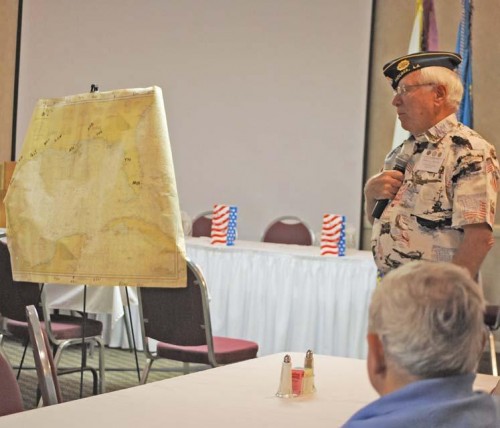
Andrew Galliano Sr.
October 19, 2010
Local historian revisits WWII submarine warfare
October 21, 2010(CNS) – The previous Louisiana Constitution, passed in 1921, was subjected to a whopping 802 proposed amendments in its 53-year history. Voters approved 536 of those, the most of any state constitution in the U.S.
The 1921 document was originally less than 50,000 words but by 1973, when then-Gov. Edwin Edwards saw the need for a new constitution it grew to more than 250,000 words, making it the nation’s lengthiest as well. In 1970, disgruntled voters defeated all 53 proposed amendments.
The 1973 Constitutional Convention convened in Baton Rouge, producing a document of only 35,000 words in length. It was approved by voters in 1974 and since then 155 of 223 proposed amendments have been approved. The best year was 2006 when 21 of 21 proposed amendments passed. The nadir was 1992 when voters approved only two of 12.
Unless the proposed amendments are tied to a major election, voter turnout is traditionally low, ranging as low as 18 percent (1993). That’s because voters rarely understand-or really care about the amendments.
On Nov. 2, Louisiana voters will again be asked to decide on 10 proposed constitutional amendments (two were approved earlier this month). While most again apply only to a select clientele and are difficult to understand, there are a couple that warrant special attention. (For a detailed explanation of each amendment, log onto the Public Affairs Research Council’s web page at: http://www.la-par.org/Publications/PDF/ConstAmend_Nov2010.pdf.)
Amendment One is probably the one that will generate the most interest statewide with Amendment Two a close second from the perspective of individual parishes.
A vote for Amendment One would require than any increase in the salaries of statewide elected officials, public service commissioners, or legislators not take effect until the beginning of the next term after the increase is approved.
State civil service employees were infuriated earlier this year when it was learned that legislators had received a 9.7 percent increase while at the same time denying 4 percent merit increases for classified employees.
In 2008, legislators passed a 123 percent increase for themselves but the public outcry was such that House Speaker Jim Tucker made an 11th-hour appeal that Gov. Bobby Jindal veto the increase. Jindal, who had initially said he would not veto the bill, nevertheless complied with Tucker’s request and legislators hoped that the incident would be forgotten.
But if that anger carries over, the amendment is almost certain to pass, meaning office holders would not benefit from any approved pay increase unless they are re-elected sense the increase would not take effect until the beginning of the next term of office.
Earlier this month, voters may have unwittingly approved an amendment that changed employees of the State Department of Homeland Security from classified to unclassified, meaning they would not be restricted by the freeze on classified employee salaries and could receive virtually unlimited increases.
The legislature is responsible for determining the salaries for statewide elected officials, members of the Public Service Commission, and members of the Legislature. Proponents of the amendment say there would be less incentive for legislators to pass pay raises for themselves if they could not benefit personally unless they were re-elected.
Opponents say that such a restriction should be statutory – that is, passed by the Legislature in the form of a new law – rather than by amending the constitution.
Amendment Two would increase state severance tax revenue for parishes of origin and also dedicate a portion of severance tax collected on state lands to the Atchafalaya Basin Conservation Fund.
Local governments are prohibited from levying any severance taxes and the sharing of state severance tax revenue goes all the way back to that 1921 constitution and is intended to compensate parishes for wear and tear on local roads and bridges by oil and gas drilling equipment and other related traffic.
The present constitution requires the state to pay parishes or origin 20 percent of the state severance tax on all natural resources except sulfur, lignite, or timber. The amount each parish can receive, however, is capped at $850,000, adjusted annually for inflation. The cap for 2009 calendar year was $907,534.
Opponents of the proposed amendment question the wisdom of the state’s giving up more revenue to benefit parishes. They argue that mineral resources are considered assets of the state as a whole and an increased dedication would prevent the state from using revenue where most needed.
Proponents counter that increasing the cap above the inflation rate is justified because parishes should receive a larger share of minerals taken from them.
Other amendments, if passed:
• Number 3: would give parishes the option call elections to double the homestead exemption for veterans with service-connected 100 percent disabilities (this benefit would extend to certain surviving spouses);
• Number 4: would limit property tax millage increases that non-elected taxing bodies following a mandatory millage decrease due to reassessment;
• Number 5: would allow homeowners displaced by disaster to apply for a second five-year extension on special assessment levels and homestead exemptions if they are unable to reoccupy their homes due to pending appeals on damage claims;
• Number 6: would require majority legislative approval for changes to benefits provisions of any public retirement system subject to legislative authority, and would require two-thirds legislative approval when any changes have an actuarial cost;
• Number 7: would change bidding rules for tax sale auctions and would allow tax collectors to charge additional penalties for nonpayment of property taxes;
• Number 8: would remove the requirement that public authorities first offer expropriated property for re-sale to its prior owner before the property can be sold to a third party provided the property was taken to remove a public health or safety threat and was held for 30 years or less;
• Number 9: would require that certain workers’ compensation cases be re-argued before a panel of five or more appellate judges prior to the reversal or modification of an administrative agency’s decision (present law requires a majority vote of a panel of only three judges).
• Number 10: would allow criminal defendants to waive rights to a jury trial in non-capital cases only if the waiver is made at least 45 days prior to the beginning of trial and would provide that any such waiver would be irrevocable.








